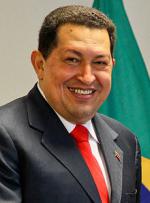Disable ads!
Hugo Chavez
Part of a series on Socialism Development History of socialism Socialist calculation debate Socialist economics Ideas Calculation in kind Cooperative Common ownership Economic planning Equal opportunity Free association Input-output planning Labour voucher Material balancing Peer-to-peer economy Production for use Public ownership Self-management Social dividend Socialism and LGBT rights Socialization To each according to his contribution Workplace democracy Models Decentralized planning Participatory economics Market socialism Lange model Mutualism Economic democracy Planned economy Soviet-type Project Cybersyn Socialist market economy Socialist-oriented market Variants Agrarian Anarchist Authoritarian Democratic Ethical Ecological Guild Impossibilism Liberal Libertarian Market Marxian One country Owenism Reformism Religious Revisionism Revolutionary Ricardian Scientific Social democracy State Syndicalism Utopian Zionist 21st-century History by country Brazil Canada France India Netherlands New Zealand Pakistan United Kingdom United States People Charles Hall François-Noël Babeuf Henri de Saint-Simon Robert Owen Charles Fourier Louis Auguste Blanqui William Thompson Thomas Hodgskin Pierre Joseph Proudhon Louis Blanc Moses Hess Karl Marx Friedrich Engels Mikhail Bakunin Ferdinand Lassalle William Morris Peter Kropotkin Edward Carpenter Mary Harris Jones Georgi Plekhanov Fernand Pelloutier Eugene V. Debs Ben Tillett John Dewey G. D. H. Cole Eduard Bernstein Antonio Gramsci Luis Emilio Recabarren Sidney Hook Leon Trotsky Rosa Luxemburg José Carlos Mariátegui Enrico Barone Fred M. Taylor Errico Malatesta Anton Pannekoek Farabundo Martí Oskar R. Lange Abba P. Lerner Léon Blum Mao Tse Tung Edvard Kardelj Farabundo Martí Clement Attlee Josip Broz Tito Einar Gerhardsen Olof Palme Fidel Castro Ho Chi Minh Ernesto Guevara Salvador Allende Deng Xiaoping Mikhail Gorbachev Hugo Chávez Evo Morales Organizations First International (International Workingmen's Assoc) Second International Third International (Comintern) Fourth International Fifth International Socialist International World Federation of Democratic Youth International Union of Socialist Youth World Socialist Movement International Committee of the Fourth International Socialism portal Economics portal Politics portal v t e Hugo Rafael Chávez Frías (Spanish pronunciation: [ˈuɣo rafaˈel ˈtʃaβes ˈfɾi.as]; 28 July 1954 – 5 March 2013) was a Venezuelan politician and the President of Venezuela from 1999 until his death in 2013. He was the leader of the Fifth Republic Movement from its foundation in 1997 until 2007, when it merged with several other parties to form the United Socialist Party of Venezuela (PSUV), which he led until 2012. Born into a working-class family in Sabaneta, Barinas, Chávez became a career military officer, and after becoming dissatisfied with the Venezuelan political system, he founded the secretive Revolutionary Bolivarian Movement-200 (MBR-200) in the early 1980s to work towards overthrowing the government. Chávez led the MBR-200 in an unsuccessful coup d'état against the Democratic Action government of President Carlos Andrés Pérez in 1992, for which he was imprisoned. Released from prison after two years, he founded a socialist political party, the Fifth Republic Movement, and was elected president of Venezuela in 1998. He was re-elected in 2000. During his second presidential term, he introduced the system of Bolivarian Missions, Communal Councils, and worker-managed cooperatives, as well as a program of land reform, while also nationalizing various key industries. He was re-elected in 2006 with over 60% of the vote. After winning his fourth term as president in the October 2012 presidential election, defeating Henrique Capriles, he was to have been sworn in on 10 January 2013, but the National Assembly of Venezuela agreed to postpone the inauguration to allow him time to recover from medical treatment in Cuba, resulting from a return of the cancer that was originally diagnosed in June 2011. Chávez died in Caracas on 5 March 2013 at the age of 58. Following Chavismo, his own political ideology of Bolivarianism and Socialism of the 21st Century, he focused on implementing social reforms in the country as a part of a social project known as the Bolivarian Revolution. He implemented the 1999 Venezuelan Constitution, participatory democratic councils, the nationalization of several key industries, and increased government funding of health care and education and made significant reductions in poverty with oil revenues. According to the ECLAC, from 1999 to 2012, Venezuela achieved the second highest rate of poverty reduction in the region; with World Bank data showing that the poverty rate dropped from 49.4% to 25.6%. The Bolivarian Missions have entailed the construction of thousands of free medical clinics for the poor, the institution of educational campaigns, and the enactment of housing subsidies. However, food subsidies an
 Read more on wikipedia.org Read more on wikipedia.org
 All quotes by Hugo Chavez All quotes by Hugo Chavez
 Edit Edit
|

|
|
|
|
|
Background photo by Giuliana
|